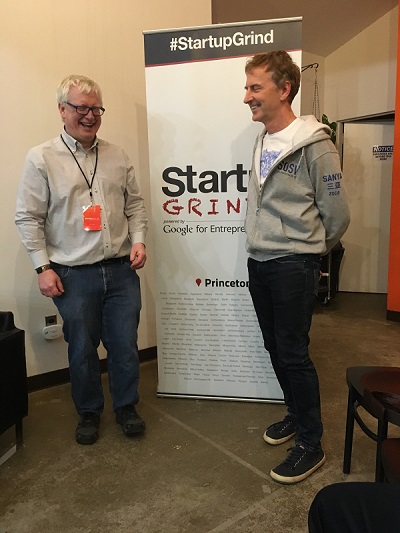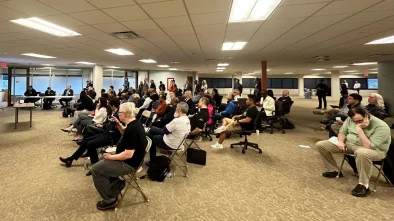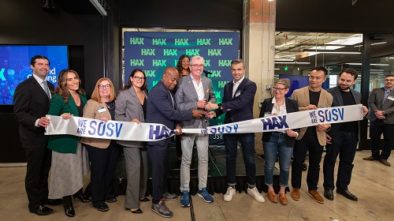Sean O’Sullivan Talks about SOSV’s Accelerators, Building Teams at Startup Grind
One of the largest decentralized accelerator programs in the world, SOSV, is headquartered in Princeton, a fact that many don’t know.
Its founder and managing general partner, Sean O’Sullivan, is a Princeton resident, engineer, inventor and “now a venture capitalist.” He came to Startup Grind Princeton to talk about his entrepreneurship journey and his investment philosophy. The conversation was guided by David Stengle, who organizes Startup Grind Princeton.
O’Sullivan is a well-known name in the tech community. For example, he is credited with inventing the term “cloud computing,” Very early in his career, he invented a way to type an address into a box and retrieve a street map of that address, through a company he founded called “MapInfo.”
Now O’Sullivan devotes his time to SOSV, which, according to the company’s website, “provides intellectual and financial capital to accelerate founders’ big ideas for positive change. SOSV has funded over 700 startups to date. We currently fund over 150 startups per year through our programs: HAX (hardware and connected devices), IndieBio & RebelBio (life sciences), Chinaccelerator (cross-border internet & mobile in Asia) and Food-X (food innovation).” A new blockchain accelerator to be located in New York is now taking applications.
O’Sullivan grew up on welfare, in a family with nine kids and a “deadbeat dad” who left for good when he was three. He made it to Rensselaer Polytechnic Institute, a technological research university in upstate New York, and started his first company.
“What enabled me to get ahead was education,” he said. So it was in a spirit of giving back that he underwrote Kahn Academy (Mountain View, Calif.), a free educational resource, very early on in its development.
After he sold his first company, O’Sullivan tried a lot of different careers, including those of musician and filmmaker, but he realized that the most impact he could have on the world “was to create lots of companies.” He invested as a “super angel” for many years, but he formalized his investments into a real venture capital firm. And now, he said, “We have about 110 staff, which for a VC firm is huge.”
“We can take a team of two, four or five people and make them look like a 50-person organization.” Sean O’Sullivan
“Our focus is different from most venture firms. We do something very unique.” While SOSV started by backing companies O’Sullivan liked and thought had a good chance of success, it now goes much deeper into tech. By starting accelerators, O’Sullivan’s team found that they could place “a lot of shots on goal and build ecosystems and work with founders at a stage that I find is most enjoyable,” which is very, very early on.
More than 5,000 companies apply each year to get into the SOSV accelerators, and the 150 who get accepted receive between $100,000 and $250,000 (depending on the accelerator) for the first commitment; in return, they give up about 7 percent of their equity.
“We take those companies; get them market validation; work with them to get the proper market fit working; and, depending on which accelerator, we work with them deeply on the technologies.” At the HAX location in Shenzhen, China (there’s another one in San Francisco), SOSV has a 50,000-square-foot space with various types of manufacturing equipment and 28 engineers on staff, O’Sullivan said. The engineers know radio-frequency engineering, industrial design, mechanical design, design for manufacturing and so on. “We can take a team of two, four or five people and make them look like a 50-person organization.”
The team is paramount, O’Sullivan explained. “You can’t just be a single person and get much done. You have to be able to work with a team. We won’t back a single founder. Not because a single founder can never make it, because they can, but it’s a slower way to try and make it. You also end up with a lot of psychopaths. If you’ve got a couple of people who are working together and trust each other, that’s a pretty good indicator.” There will be hard times, there may be times when founders need to go without paychecks; and the company won’t get through these lows unless the team has a high level of commitment. O’Sullivan said that it’s even better when the team members actually love each other.
“When we look at teams these days, we actually give all of our startups personality testing.” Sean O’Sullivan
As a founder, you have to build a team and recognize that you don’t want carbon copies of yourself on it, Sullivan said. You want a highly balanced team. “When we look at teams these days, we actually give all of our startups personality testing.”
There are multiple types of people: Some are more focused on relationships, some focus on innovation, some focus on synthesis and society, while others are more analytical. SOSV administers this testing before it makes a major investment, although not before it takes a company into the accelerator, because the team will change and get rounded out as the startup grows.
SOSV applicants apply for the vertical they are interested in, and fill out a form. From eight to 15 teams are accepted into a cohort. Those companies are physically resident in the SOSV space for the period of time, typically for about four months, but in a larger space like HAX, they can stay for a year. At the end of that period, there is generally a demo day, and in addition to the funding it provides, SOSV helps them find the best financing.
Then there are specialized services for the companies. At the IndiBio accelerator, for example, there are wet lab facilities and all the equipment needed for genetic engineering and synthetic biology.
“I think that community, that sense of community, is the most phenomenal benefit,” O’Sullivan told Stengle. “Actually being able to go to others and share really bad deep problems and the dark moments of the soul that everyone has as a founder” is one of the major plusses of being in this environment.




